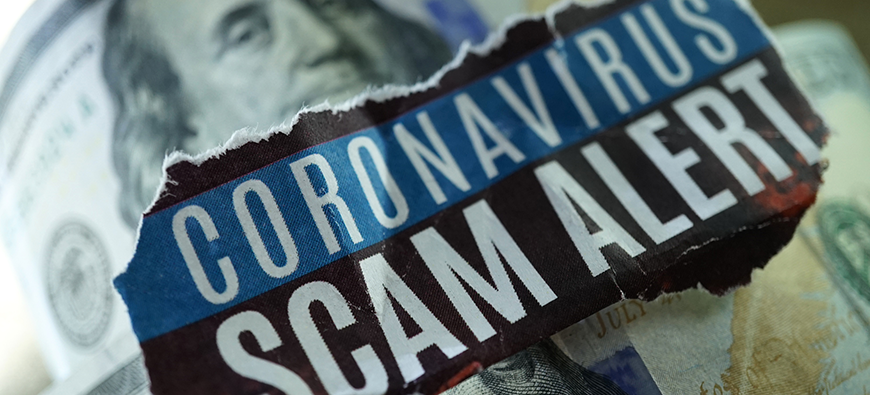
Covid-19 Fraud: A Financial Pandemic
Brought to you by RADD LLC

Even as some regulators have reduced reporting requirements, the Financial Crimes Enforcement Network (FinCEN) has opted for a less-relaxed approach in regard to financial institutions and Bank Secrecy Act compliance.
Earlier this year, FinCEN offered some insight into its expectations regarding the Covid-19 pandemic as it applies to BSA. It noted that financial institutions will face challenges related to the pandemic but “expects financial institutions to continue following a risk-based approach” to combat money laundering and related crimes and “diligently adhere” to current BSA obligations. There are some special issues that banks should look out for, along with reporting requirements surrounding those issues.
Potential Fraud Indicators
An 2017 advisory letter outlines some potential fraudulent activities that can occur during a natural disaster or relief efforts. The release was intended to help financial institutions identify and prevent fraudulent activity that may interfere with legitimate relief efforts. The following are likely issues that could arise in the wake of a disaster.
- Benefits Fraud – Benefits fraud typically occurs when individuals apply for emergency assistance benefits to which they are not entitled. Financial institutions are at risk when fraudsters seek to deposit or obtain cash derived from the emergency assistance payments. FinCEN noted that fraudsters often used wire transfers to perpetrate these scams. In those situations, they request withdrawals and the banks wire funds to the accounts, where the fraudster immediately withdraws the funds.
- Charities Fraud – Charities provide a vehicle for donations to assist disaster victims; during times of disaster, criminals seek to exploit these vehicles for their own gain. Both legitimate and fraudulent contribution solicitations and schemes can originate from social media, emails, websites, door-to-door collections, flyers, mailings, telephone calls and other similar methods.
- Cyber-Related Fraud – Cyber actors take advantage of public interest during natural disasters in order to conduct financial fraud and disseminate malware. The Center for Internet Security expects this trend to continue, as new and recycled scams emerge involving financial fraud and malware related to natural disasters.
According to an October release, FinCEN advised financial institutions to remain alert when it comes to fraudulent transactions that resemble those that occur in the wake of natural disasters. FinCEN is monitoring public reports and BSA reports of potential illicit behavior connected to Covid-19 and notes some emerging trends, in addition to those issues identified above.
- Imposter Scams – Bad actors could attempt to solicit donations, steal personal information or distribute malware by impersonating healthcare organizations or agencies like the Centers for Disease Control and Prevention or the World Health Organization.
- Investment Scams – The U.S. Securities and Exchange Commission urged investors to be wary of coronavirus-related investment scams, such as promotions that falsely claim that the products or services of publicly traded companies can prevent, detect or cure coronavirus.
- Product Scams – The U.S. Federal Trade Commission and U.S. Food and Drug Administration have issued public statements and warning letters to companies selling unapproved or misbranded products that make false health claims pertaining to Covid-19. Additionally, FinCEN has received reports regarding fraudulent marketing of coronavirus-related supplies, such as certain face masks.
- Insider Trading – FinCEN has received reports regarding suspected coronavirus-related insider trading.
Suspicious Activity Reporting
FinCEN still expects institutions to report suspicious activity – however, there are some special expectations within the reporting fields. FinCEN requests, though does not require, that financial institutions reference the 2017 advisory letter and include the key term “disaster-related fraud” in the SAR narrative and in SAR field 31(z) (Fraud-Other) to indicate a connection between the suspicious activity being reported and possible misuse of relief funds.
New FinCEN COVID-19 Online Contact Mechanism
FinCEN has created a coronavirus-specific online contact mechanism, via a specific drop-down category, for financial institutions to communicate related concerns to FinCEN while adhering to their BSA obligations. While this reporting program is in place, FinCEN has not committed to more than an automated response to any communications received.
FinCEN has continued to encourage banks to follow existing guidance and regulation in an effort to secure transactions within the financial services space. FinCEN will offer additional guidance as fraudsters are identified and their efforts are better understood. Until then, financial institutions may do well to ensure that their BSA and anti-money laundering programs are prepared to weather the storm.


